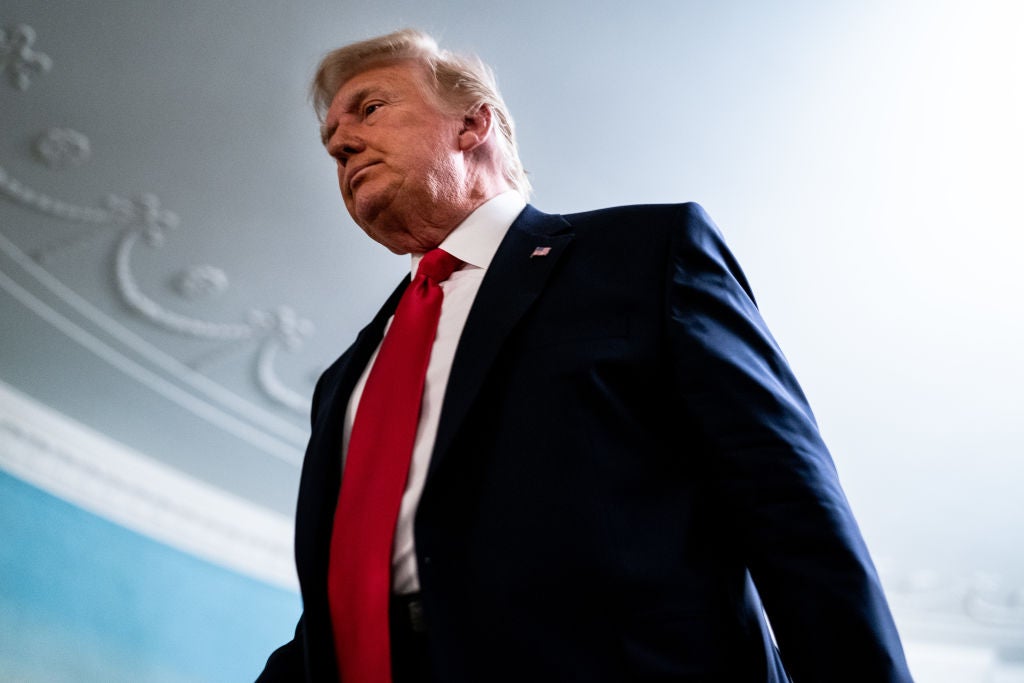This year has shown us Trump wanted power — but he didn’t want to govern
The 45th president’s philosophy has become clearer over the past few months


In The Leopard, Giuseppe Tomasi di Lampedusa's elegiac novel about the downfall of the Sicilian ancien regime in 1860, the ageing Prince Don Fabrizio ruminates on the nature of power.
On a carriage ride into Palermo he sees the ominous fires of Garibaldi's revolutionaries up in the mountains as they prepare to spring into action; and gazes down at the wealthy churches, abbeys and monasteries in the city below that will be among their targets.
The prince wonders whether both sides have more in common than either would like to admit, whether each is "as fanatical, as self-absorbed, as avid for power or rather for the idleness which was, for them, the purpose of power".
The pursuit of power for the purpose of doing nothing? It's not something that could be ascribed to most modern politicians. But it certainly rings true of Donald Trump, who is now in the final weeks of his single White House term.
As the world considers his legacy – or tries to, over the noise of his tantrum-filled exit – it's hard to avoid one of the constant themes of the multifarious books, articles, news reports and testimonies about his four years in power: his apparent lack of interest in actually governing.
For instance, one of the quotes that looks likely to dog him through history came in March 2020 when he was questioned about his administration's fumbling of the coronavirus testing programme: "I don't take responsibility at all."
This from the same man who a month later boasted that "when somebody is president of the United States the authority is total".
At first glance, the two statements and the attitudes they represent are counterintuitive. But in fact they are key to Trump's understanding of the presidency – power without responsibility, status without the need to actually do much. Rewards and favours for those who bend the knee; vengeance and persecution for those who don’t.
That philosophy came into focus again this Christmas. The House and Senate finally passed a coronavirus stimulus bill, something millions of desperate citizens have long been crying out for. But only once they had declared victory and left DC for the holidays did Trump, notably absent from the fray thus far, finally pipe up, demanding a do-over that would increase payments to ordinary Americans and strip foreign aid from the omnibus bill.
His inaction over the coronavirus, his habit of passing responsibilities and blame on to governors and his concerted efforts to defy and undermine his own health experts are among the key reasons for his defeat. Perhaps, had he put the same energy into fighting the pandemic as he has into promoting madcap conspiracies and trying to overturn the will of the American people, he might not now be facing a humiliating eviction.
So what view will the new administration take of their power once Joe Biden is sworn in at midday on 20 January?
The early signs, as with any normal incoming administration, suggest dramatically heightened levels of activity. Biden, a seasoned political operator, has been setting out his plans to fight the pandemic. After four years of the phrase "infrastructure week" becoming a Godot-like running joke, transportation pick Pete Buttigieg is certainly talking a good game. Normality, for good or ill, should soon be restored in America's dealings on the international stage. All of course depends on who controls the Senate after the Georgia runoffs on 5 January.
As for Trump himself, his post-presidency power is already assured – up to a point. He has amassed a huge fighting fund from supporters keen to help him in his unfounded claims of election fraud, and his profile will continue to be amplified through right-wing – and mainstream – media. It's likely he will waste little time holding rallies to restore the endorphin rush of adulation that so energises him.
Whether he parlays that power into a 2024 run or prefers to snipe from the sidelines (birtherism Mk II perhaps?) will be one of the most interesting stories The Independent will be following in 2021.
So will his relationship with the Republican Party, as an increasing number of previously tame politicians – alongside influential boosters like televangelist Pat Robertson – step away from him. For many in the GOP, who have long privately loathed but feared Trump, his exit provides an opportunity to shake off his suffocating dominance.
Republicans keen to restore the core conservative values that Trump had little use for (managing the deficit for one) may agree with another warning from The Leopard: "If we want things to stay as they are, things will have to change."
Phil Thomas
Assistant editor (US)
Join our commenting forum
Join thought-provoking conversations, follow other Independent readers and see their replies
Comments